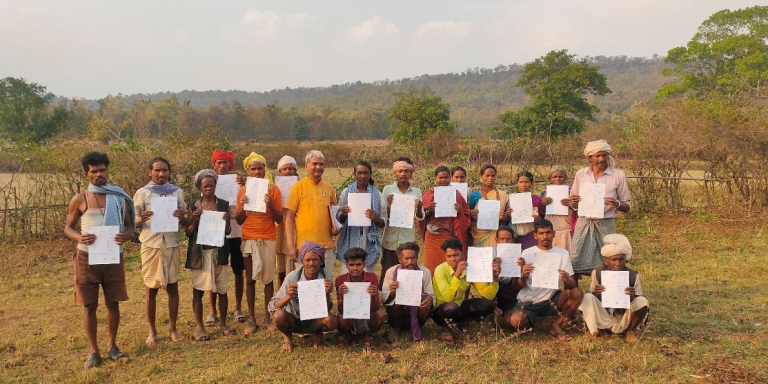Project: Securing Individual Forest Rights (IFR) for the forest villages of Madhya Pradesh using geospatial technology

Pondi villagers with new correct IFR titles
Background:
Forest Villages have suffered extreme forms of historical injustice as they are still largely controlled and administered by the forest department. These villages were created by the colonial forest department by settling Adivasi households within specific patches of reserve forests. This was done to ensure permanent supply of labor for forestry operations, mainly timber felling. Section 3(1)(h) of the Forest Rights Act provides for the conversion of forest villages into revenue villages. Before such conversion, there should be 100% recognition of Individual Forest Rights for all lands under cultivation and habitation. Even after 18 years since the enactment of the FRA, recognition of IFR is very low in forest villages, ranging between 20-50% of the actual land of the forest villages. This is because the process of claim-making is largely controlled and run by the forest department and street-level bureaucracy, sidelining the community and Forest Rights Committees (FRC). Geospatial tools can solve the long pending problem of IFR, by equipping FRCs and gram sabhas to take charge of the claim-making process.
Problem:
Since 2008 when the implementation of FRA began, some residents of FVs have received IFR titles. The claim making process was conducted based on the orders from the top without involving FRCs. Tools used by the forest department were outdated and the information was rarely shared with FRCs. As a result, these titles have many discrepancies. In many cases, the rights have been partially recognized as plots have been left out. In some titles, the area recognized is very low as compared to the actual area under cultivation. The title holder can’t identify the location of their farm by reading the maps in the title received. Some people haven’t received titles as their claims have been kept on hold/rejected by the administration without informing the gram sabhas the reasons for rejection. As a result, residents of FVs are struggling to access benefits of various government programs that demand land titles for fulfilling eligibility criteria.
Solutions:
To resolve the problem of IFR, FRCs need to be strengthened on legal and technical fronts for bottom-up and transparent claim-making. We started the work in two villages: Pondi and Sheetalpani, where technical training was given to the teams formed by the FRCs for carrying out mapping work. Aamcho-CFR, a handy mobile based app developed by ATREE was used by the FRCs along with some other apps. The wall-to-wall mapping of 100% plots within the boundaries of FVs was completed. Community lands such as schools, ponds, grazing land, and forest within traditional boundaries were also mapped separately. The analysis was presented to the collector of Dindori. The collector, upon accepting the mistake made by the administration in recognizing IFR, invited ATREE to take the work forward by supporting comprehensive claim-making in two villages, which can be a pilot for all other FVs. Claim-making camps were organized by the FRCs. The gram sabhas scrutinized all maps, suggested corrections, resolved conflicts, and approved the claims. Not a single plot in these two villages was left unidentified and unmapped.
Outcomes:
The District Level Committee (DLC) of Dindori has recognized that all maps and claims are correct and the process followed by the two villages should be replicated in other forest villages. IFR titles have been issued in the first round. The collector has asked ATREE for policy outreach at the state office of the Tribal Welfare Department to issue enabling orders for forest villages. The use of geospatial technology has boosted the confidence of FRCs. People from villages of Baiga Chak and Elected representatives have visited Pondi and Sheetalpani and participated in training to learn the mapping tools. As awareness is increasing, gram sabhas are passing resolutions for initiating the claim-making process.